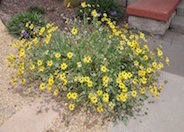
Common name:Chocolate Flower
Botanical name:Berlandiera lyrata
This perennial grows quickly to 1' x 2'. Will bloom from spring to fall with yellow daisylike flowers. Flowers have distinctive chocolate scent. Full sun to part shade. Dead head to prolong flowering. Native to the southwest U.S. and Mexico.
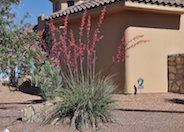
Common name:Red Yucca
Botanical name:Hesperaloe parviflora
Upright rosettes grow quickly to 3' x 5' wide. Spectacular accent for desert landscape. Leaves are dark green and strap-like. Coral red flower spikes emerge in spring & remain on plant till end of summer. Tolerates tough conditions including reflected heat and frost. Attracts humingbirds. Native to western Texas and northeastern Mexico.
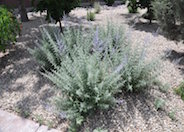
Common name:Azure or Russian Sage
Botanical name:Perovskia X atriplicifolia
This broad perennial will grow 3'-6' tall and has small, gray green leaves with blue violet flowers that bloom in the summer.
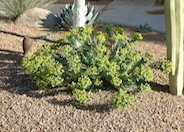
Common name:Blue Euphorbia
Botanical name:Euphorbia rigida
Evergreen mounding groundcover grows at a slow-moderate to 2' x 3'. The charteuse flowers appear midwinter through spring and add a nice contrast to the blue-green leaves. This plant truly has striking flowers and floliage. Low maintainance. Sap from plant may irrigate skin. Native to the Mediterranean.
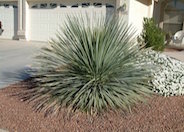
Common name:Desert Spoon
Botanical name:Dasylirion wheeleri
Evergreen with open rosette form grows at a moderate rate to 4' x 4'. Saw toothed gray-green leaves have interesting twisting affect. Flowes are cream and appear on tall stalks late spring to summer. Distinct accent plant. Accepts full sun and is very frost tolerant. Native to southern Arizona and the Chihuahuan Desert.
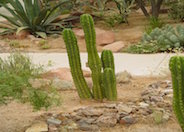
Common name:San Pedro Cactus
Botanical name:Trichocereus pachanoi
Trichocereus pachanoi is a cactus that has ribs that are full and plump, usually green in color, sometimes blue. Flowers are hairy. No fruit is produced, only seeds. This columnar cactus grows very fast and is cold tolerant.
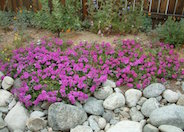
Common name:Common Verbena
Botanical name:Verbena peruviana cv.
This perennial forms a flat mat that covers an area rapidly. It has dark green leaves with clusters of bright flowers that bloom all year. Hybrids will have a little more height, different flower colors and spread more slowly. This groundcover is drought tolerant.
Designer: Sallie Homan
Photographer: GardenSoft
Practice grass-cycling by leaving short grass clippings on lawns after mowing, so that nutrients and organic matter are returned to the soil.
Water-wise plants can be beautiful as well as practical.
Ask at your local nursery for the types of plants that have minimal watering needs.
Remove irrigation water and fertilizer from areas where you don't want weeds to grow.